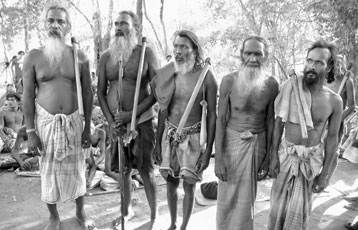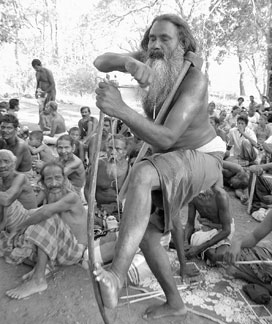'We are not primitive in our way'
by Amal HEWAVISSENTI
My recent visit to Dambana gave me a good opportunity to explore the
unique culture of the Veddha community (indigenous people or forest
dwellers) at its most superficial level.
There, for the first time, I realised why we should study and explore
the cultural traditions of Veddahs nourished by the ethnic legacy of
their forefathers in Sri Lanka. They may appear outlandish in their
community set up but they `preserve a unique identity and trace a
rightful lineage from the earliest history of Sri Lanka.
These forest dwellers are part and parcel of Sri Lankans but they
have lost the support, sympathy and links with the other communities
because of their tribal lifestyle and reluctance to have communications
with the outside world.
 |
|
Wanniyeleththo: Beauty
of their small world is fading away day by day |
They are out of line with the trend of other communities by rejecting
academic education and religions, by using spoken language rather than
written language and by showing strong protest against being socialised
with other communities. And this is primarily why they have been
successful in living as a tribal nation with simple lifestyle in which
they could share ideas and everything with a special jargon of their
own.
Their mode of life
Be that as it may, at Dambana the Veddahs are mere orphans in face of
modern Sri Lankan social frame with high level of development. They seem
to be fighting a constant (losing) battle to regain their lost world of
ethnic origins and to cope with the painful awareness that modern
society does not recognise them with respect and friendship. At present
the biggest problem the Veddahs as a separate community face is gradual
loss of their land - a problem that has drastically narrowed down their
production process.
It does not escape our notice that forest dwellers' way of production
is absolutely based on the principle that day-to-day supply of food is
enough to sustain life. There is little doubt that their only means of
existence, therefore is jungle in which Veddahs collect bees honey, go
hunting and continue chena cultivation. So they strongly believe in the
vitality of jungle as the haven that safeguards their identity and
endorses their traditional production mode.
Jungle - the elixir
Uruwarige Wanniyeleththo,, the son of Thisahami, once a great leader
of Veddas let loose a torrent of strong feelings on the change that has
come over the smooth functioning of their lifestyle and culture.
"In the past, we were allocated a forest region called Mahavedi rata
by ancient Sinhala kings. Therefore our ancestors had been able to live
the sort of life we could only fantasize about living. Those kings had
identified our lifestyle and culture. Even the Sudu Hoorala (white men)
did not interfere with our Kele pojja (jungle).
After 1947, the development programs confused our Sith pojja (mind)
and overall lifestyle. Authorities instructed us to clear the jungle and
keep on with chena cultivation. In this way Mahavedirata became a barren
land. We are naturally hunters and gatherers.
The English law has labelled our traditional way of life as a crime.
In no way can I understand where that law came from? We are
Wanniyeleththos (fores-dwellers). That clearly says we are people of
jungle. The law says we are poachers.
So, hunting for our living and collecting bees honey are crimes! Our
people who lived on the lap of nature have now been trapped into a
lifestyle we are unaccustomed to, Bota Kada (elephant), Kabara (deer),
Manya (bear) or Kankuna (stag) are no longer to be seen. They do not
belong to us. We feel we are already running fast into extinction. We
often get sick because today we have seriously run short of bees' honey
and game. We have been deprived of our land and above all, our identify.
It is a body blow to us".
These remarks explicitly echo the painful reaction of a secluded
community who are losing their livelihood day-by-day with the
declaration of forest reserves. We force them to engage in farming and
increase production but the indigenous people are not at all used to
that sort of life. Unluckily we labour under the considerable delusion
that we could uplift their living condition by projecting our own
agricultural techniques or culture on them. We must under no
circumstances mistake their uncivilised' lifestyle for their inability
to match up to the standard of the outer world. Yet it is their unique
identify that has been their lifeblood.
What they speak to us implies nothing other than painful condemnation
of civilised man's interference with them. Because of this unnecessary
intrusion, they are not even allowed to Mangachchanna (go) to the Kele
pojja (jungle) to collect bees' honey.
Sri Lankan Seatle
Thisahami, the famous ex-leader of Veddahs was somewhat a Chauvinist
in his vehement protests against his community to be modernised. His
vision for the community runs parallel to the famous speech by Seatle,
the Red Indian Chief, who considered nature as his parents.
In a speech delivered to a group of visitors (some friends of mine)
Thisahami had voiced his increasing dissatisfaction of the modernisation
that was looming over the identity of his community. According to my
friend's recording this is how he gainsaid the attempts to take his
followers to the civilised world:
"We are not at all used to cultivate paddy fields. We deeply love and
depend on our jungle where our past generations flourished. My ancestors
died in the jungles and I too will die in the jungles. We need the
jungle to collect bees' honey and game, do rituals for Yakkhas and do
chena cultivation. I am not used to live in the new Mahaweli Settlements
like a bird in the cage. I am free in the jungle and my life's breath is
the jungle".
Once again, this is a lamentable condition of a leader held
responsible for his community who stood for the rights of his people. He
painfully marked how their tradition production mode and lifestyle were
fading to nothing when they were deprived of their land and jungle. To
all intents and purposes, jungle ensconces their name and identity in
perfect safety. That is precisely why he, like Chief Seatle, mounted a
huge protest against the efforts made to take his community to the
civilized world.
 |
|
Primitive instincts are
more powerful than systematic academic education |
Most people visit Dambana to identify the real people and their
strangely primitive nature. Most of the civilised people treat them with
a certain amount of unfriendliness because of their (seeming) lack of
education and killing of animals. That is the civilised people's
superficial way of looking at them and understanding them. Yet there is
much to be discovered in the inner recesses of their lifestyle. We are
in an era where most of the civilised people fall prey to various
diseases and illnesses mostly due to diverse nutritional imbalances.
People are used to take in pills of artificial vitamins and nutrients
separately and bring in more side effects and health risk. But what is
Veddah people's nutrition. Lesson for the educated and civilised man?
Their primitive way of life gives them lot of physical exercise and what
they take in are highly nutritional meals with lots of fibre. This food
culture virtually keeps them free from diseases, illnesses or premature
deaths and boosts health and potential for long life. The secret behind
their vibrant health lies in their intake of highly nutritious local
grains, vegetable and never ending physical activity. Their primitive
instincts are more powerful than our systematic academic education.
Confrontation of principles
Dambane Gunawardana, the first intellectual link from the Vedda
community to the outer world, is also the first ever graduate to have
emerged from forest dwellers. Being an educated member he is trapped
between conflicting principles with regard to his community and his
education representing the civilisation. Says Gunawardna, "Dambana means
our pleasant old world and culture. We the forest dwellers do not kill
animals rashly for sport. In the jungle, we go past many animals until
we come upon the animal that is enough for our community. The killed
animal will be enough for the whole village. That is where we are
different from the civilised man. That is our way. We never kill two or
three animals for one meal of the village. On the other hand, a
civilised man, once in the jungle, may kill all the animals he sees and
destroy the beauty of nature within one day. I personally believe modern
technology redoubles the rate of destruction both of man and nature. You
keep close to any civilised man and ask "are you really happy"? The
frank answer is a "no". Technology has been unable to give a solution to
these. I'm the first graduate from our community.
I studied in Colombo. I think I have damaged our culture and
instincts by getting a Degree. The degree certificate has helped me only
to remove myself from nature. A graduate certificate has done no good to
me....
The more you keep close to nature, the less scope there is for
uncleanliness. Nature cleanses. The farther we keep away from nature the
less energy we get from it.
This simply makes us ill.... Unfortunately, we as a secluded
community, have got to stagger behind the destructive world. the beauty
we see in our small world is fading day-by-day...".
This leaves much more for us to think.
|

